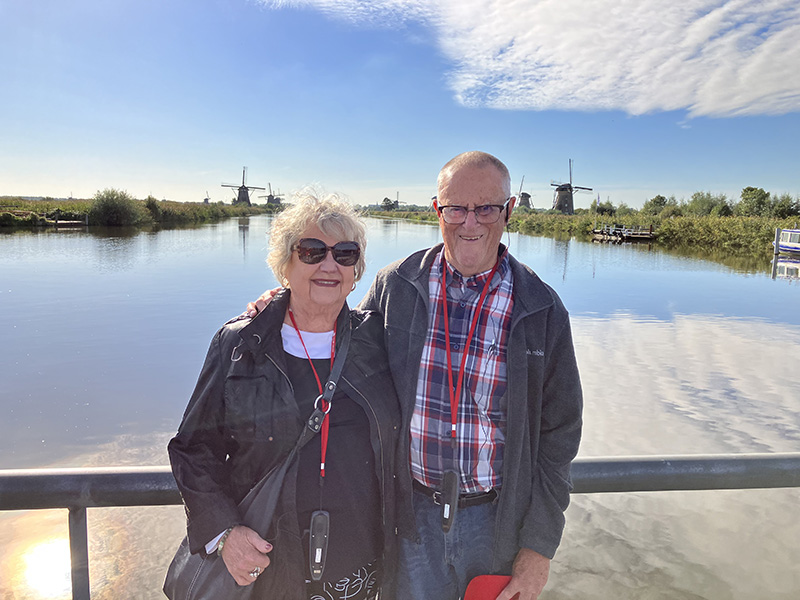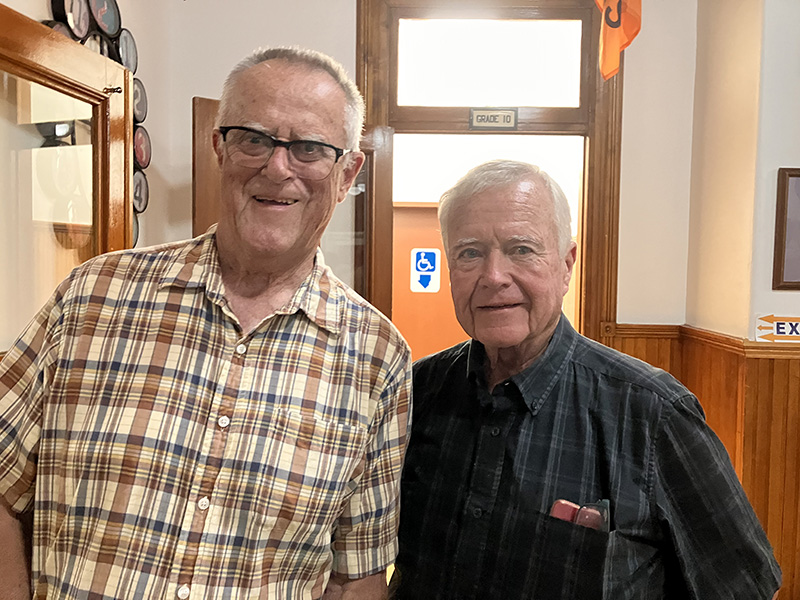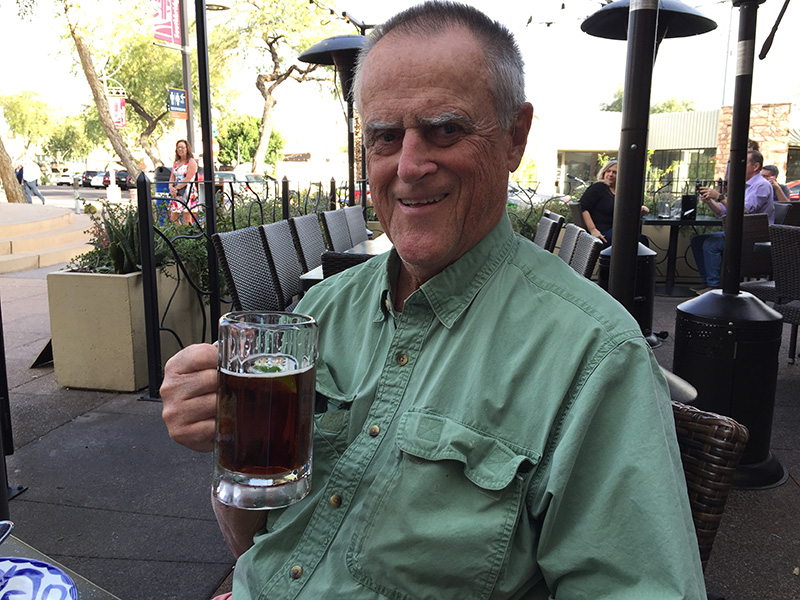How did a Boston-born fella who didn’t consider studying dentistry until the tail-end of his undergraduate degree at Tufts University become the first endodontist in Canada to practice east of Montréal?
For Dr. Steve Brayton — who also established the division of endodontics at Dalhousie’s Faculty of Dentistry in 1972 — this achievement was thanks to a series of very smart decisions (and some good timing, too!).
“I had no intentions of ever going into dentistry — it was not part of my life plan,” he tells Nova Scotia Dentist. “My dad was a physician, but I knew studying medicine was out of the picture because my grades weren’t all that great as a Tufts undergraduate.”
Not knowing what else to do, while in the last year of his Bachelor of Science degree in 1962, Dr. Brayton took (and passed) the exams for the U.S. Naval Officer Candidate School. Much to the dismay of his parents, he planned to become a Navy pilot — a top gun!
“My folks were beside themselves,” he says. “They were so frightened I was gonna get killed because the Vietnam War was cranking up. It wasn’t a real bright scenario, but it sounded exciting.”
To placate his parents, Dr. Brayton applied to Tufts Dental School and took the dental aptitude test. Two weeks before he was set to be sworn into the Navy, he received his letter of acceptance.
“My mom read the letter, sat down, and cried,” he says. “In two weeks, my whole life would have changed.”
Indeed, dental school altered Dr. Brayton’s life trajectory in many ways. For one, he didn’t have to face the uncertainty of flying F-4 phantom jets off aircraft carriers. For another, he finally had the stability to pursue a romance with Avril, a girl from Nova Scotia he met while summering in Sandy Cove. The two had been friends since childhood.
“When I was in Boston going to Tufts, Avril was going to Acadia,” Dr. Brayton says. “It was a long-distance romance, but we got married in Digby the summer I finished dental school.”

Endodontics calling
After dental school, Dr. Brayton completed a one-year internship at Michael Reese Hospital in Chicago. While there, he mentored under Dr. Frank Weine, a well-known endodontist who had written a textbook on the subject.
“Everybody assumed I was going to go into oral surgery because I’d worked my summers through college and dental school as an OR scrub nurse,” Dr. Brayton says. “Philosophically, though, [oral surgery] didn’t go with my thinking about preserving the natural dentition.”
After finishing his internship, Dr. Brayton served two years with the U.S. Navy Dental Corps during the Vietnam War. He then worked as a general practitioner in an associated practice for three years in Boston while returning to Tufts to complete his endodontics certification.
The after-graduation plan, he says, was to move to Portland, Maine, to practice endodontics.
“There were no endodontists there,” Dr. Brayton says. “I planned to practice in Portland and come down to Tufts to teach one day a week. The ferry went from Portland to Yarmouth, so it would be easy enough to visit my wife’s family in Sandy Cove and the Digby Neck.”
However, while in the undergraduate clinic at Tufts, his mentor, Dr. Cyril Gaum (an endodontist in Boston, who was from originally from Sydney, N.S., and was a Dalhousie Dental School graduate), offered some life-changing advice.
“Cyril said, ‘Don’t go to Portland — go to Halifax,” Dr. Brayton recalls. “He said there was no endodontist in Canada east of Montréal, and he suggested I start a teaching program with the dental school.”
With those words, Dr. Brayton connected with the Dalhousie Dental School and flew to Halifax to interview with the faculty’s dean, Dr. J.D. McLean. He was offered an assistant professorship and invited to establish the division of endodontics at Dalhousie. On Aug. 4, 1972, Dr. Brayton emigrated to Canada at the Calais-Saint Stephen crossing with his wife and two young daughters, Jennifer and Laura.
“And the rest is history,” he says.

Teaching and practice
In 1972, Dr. Brayton started teaching endodontics at Dalhousie. The same year, he opened his specialty practice in Halifax.
“My office was just down the street from the dental school, so I could give an 8 a.m. lecture and then run over my practice and see patients,” he says.
Working with the public was his favourite part of the job. Dr. Brayton loved transforming a fearful or anxious patient into a ‘dental convert’ by swiftly fixing their endodontic problem and preserving their natural dentition.
“When people would come in, face swollen in acute pain or with an acute pulpitis, I would listen to their tale of woe and know exactly what the problem was,” Dr. Brayton says. “I was able to freeze them up, get them comfortable, get the root canal treatment done, and then refer them back to their general dentists to get the tooth restored.”
In 45 years of practice, he estimates he did about 100,000 root canal treatments.
“Patients would walk out of the office shaking their head, saying, ‘I can’t believe I was awake all night worrying about this and it was such a non-event,’” Dr. Brayton says.
Teaching, while rewarding, was what he found most challenging.
“In my 30 years teaching, I trained at least a thousand students how to do endodontics,” he says. “I ran a tough program, but it was because I knew so many of these graduates would be going out into real rural areas and wouldn’t have the luxury of referring to any specialty, let alone endodontics. They had to know what they were doing.”
Supporting the profession
Dr. Brayton was also involved in organized dentistry, serving as Chair of the Society of Dental Specialists of Nova Scotia, President of the Canadian Academy of Endodontics, President of the NSDA, Chair of the Provincial Dental Board of Nova Scotia, and as member of CDA’s Committee on Accreditation for Canada (among dozens of other university and professional committee appointments).
“My philosophy was to make dentistry the best it can be for the public,” he says. “I did that in five ways: doing research; teaching dentists to-be; providing continuing education to help dentists upgrade their skills; getting involved in dental politics; and policing the profession through dental licensing and enforcement.”
During his career, Dr. Brayton delivered more than 50 lectures and seminars at conferences in Germany, the United States, Venezuela, Malta, and across Canada. His final involvement with the profession was, appropriately, as the J.D. McLean lecturer at Dalhousie Dental College on April 8, 2010.

Smooth sailing
Now retired 13 years, Dr. Brayton sums up this phase of life with one word: Fabulous.
“Retirement gives me more time with my wife, Avril, and time to do all the things I couldn’t do when I was practicing or teaching,” he says.
This list of activities includes travelling (throughout Canada and internationally), model boat building, cooking, listening to classical music and opera, and catching shows at Neptune Theatre and Symphony Nova Scotia.
“It makes me wonder how the hell I had the time to hold a full-time practice, teach full time, give courses around the world, take courses for continuing education, and do research, too!” he says.
Retirement has also given Dr. Brayton ample time to sail — which he considers his second great love (after his wife of 57 years, of course).
“I learned to sail at the U.S. Naval Academy when I was there in 1964 getting my officer training,” he says. “I got my first sailboat three years after I moved to Nova Scotia and I sailed until two years ago when I sold my last boat. I’ve sailed everywhere from Norfolk, Virginia, to Saint Pierre and Miquelon, and every place in between over the past 40 years.”
When asked to share some words of wisdom for dentists practicing today, Dr. Brayton reiterates his philosophy: Make dentistry the best it can be for the public.
“Stay abreast of the developments in the profession through study clubs, continuing education, and conventions,” he says. “Support the profession, your dental school, and charities.”
While Dr. Brayton may not have known from a young age that he would become an endodontist, he is certainly grateful for his incredible career.
“For me, there was nothing glamorous about wanting to be a dentist,” he says, “but, next to marrying my wife and moving to Canada, it turned out to be the best decision I ever made.”
“I’ve loved the profession. Everything about it.”
Thank you, Dr. Brayton, for taking the time to share your experiences and advice with the profession.
Are you a retired dentist embarking on your next great adventure? We would love to hear from you and share your story! Reach out to Samantha, NSDA’s Communications Manager, at communications.nsda@bellaliant.com.

